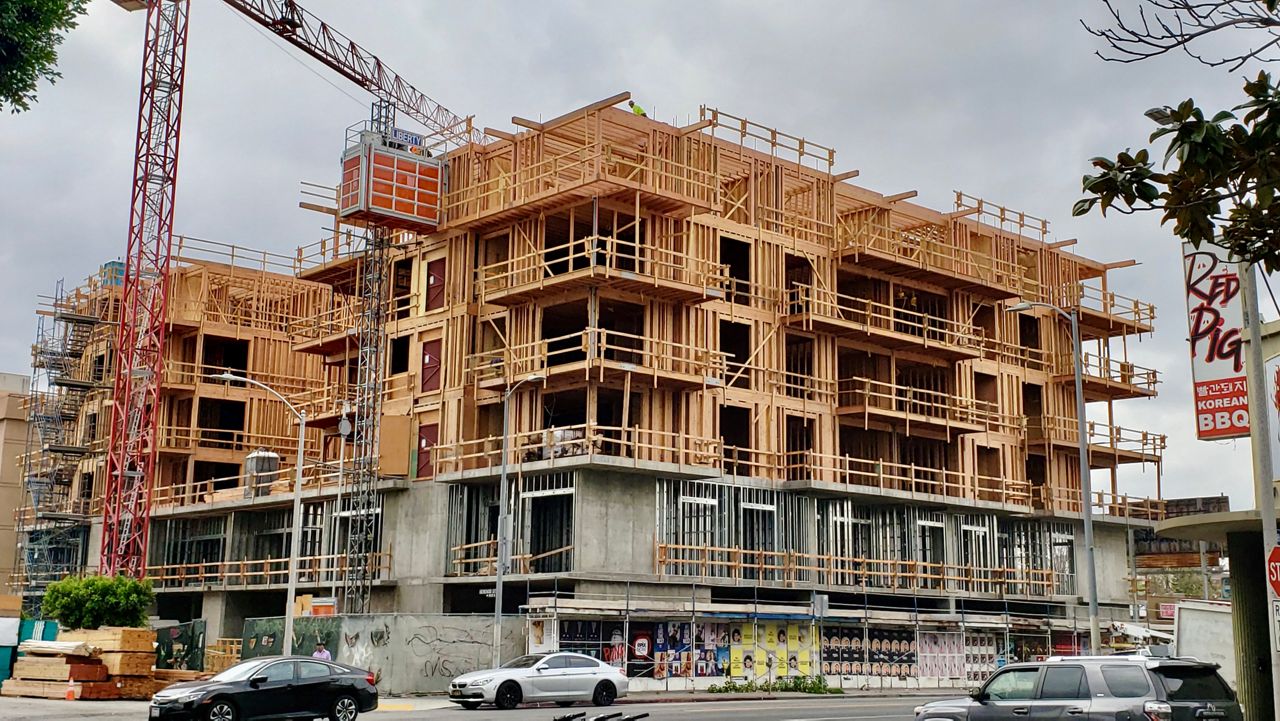LOS ANGELES — When it comes to building more housing, Los Angeles has ambitious but unrealistic plans, some business leaders say.
Last November, the city council updated its housing goals, targeting the building of nearly 500,000 new residential units — about 200,000 for low-income households — by 2029.
While those plans are progressive, it's not realistic given the city's current housing policies, officials at the Los Angeles Business Council said.
"The city council deserves great credit for setting an ambitious goal to bridge the housing shortage and related affordability gap that is widening by the day, but without significant reform and a blueprint, that goal will not be met," said LABC President Mary Leslie in a news release.
"Failing to meet this demand will worsen housing insecurity and homelessness in LA," Leslie later told Spectrum News on Thursday. "Our aim is to help propel the city toward its own goals by making these recommendations. LA’s affordable housing shortage is a critically important issue and our city can no longer afford to wait for solutions."
The LABC on Wednesday urged the city council to make significant policy changes if they are serious about meeting their housing production goals by the end of this decade. The announcement came after LABCs 20th Annual Mayoral Housing, Transportation and Jobs Summit, which addressed how to bridge the housing affordability gap and meet the vital new development goals.
The state has been pressuring cities to add more housing in recent years.
Under the Regional Housing Needs Assessment, a state housing law that requires cities and municipalities to build a certain number of residential units to accommodate growth, Los Angeles should build 456,000 new homes by 2029. About 185,000 residential units need to be reserved for low or very low-income residents.
Meanwhile, Southern California needs to plan for more than 1.3 million new residential units by that same time frame. Of that number, more than half a million units are for affordable housing.
But for the city of LA to meet its housing target in the next seven years, city councilmembers must create new policies, LABC leaders say.
According to the LABC, on average, the city would need to produce 61,000 units — of which 23,000 must be affordable to lower-income households each year for the next seven years. The 61,000 units are more than five times the amount of housing the city has permitted annually since 2014, including affordable housing.
Outgoing LA Mayor Eric Garcetti, who gave the keynote speech at the summit Wednesday, punted the housing issue to his successor and future council members.
"We voted through something that will now set an honest number of 457,000 units of housing in the city of LA. That's like a San Fernando Valley being built on top of our LA," said Garcetti, per City News Service. "Can we get there? That's a question for all of you today, and for my successor, for the city councils that will come."
Leslie said LABC is advocating for an increase in housing production, including market-rate, moderate-income, and affordable housing. This would include condos and single family homes.
The proposed reforms are aimed at improving the overall development process. They're particularly focused on increasing the production of affordable and low-income housing because this is where the greatest need exists.
LABC officials said they're teaming up with the UCLA Ziman Center for Real Estate to author a white paper "to better pinpoint the obstacles and opportunities to producing an adequate, affordable housing supply."
They plan to present the findings later this year to mayoral candidates during November's 2022 LA mayoral election.
Some of the suggestions the LABC has identified include streamlining the approval process, creating a linear start and finish timeline, removing affordable housing add-ons, and incentivizing the building of workforce housing projects.
LABC leaders said the coronavirus pandemic had exacerbated the city and the region's housing crisis.
"Los Angeles is in serious need of solutions that will effectively deliver large quantities of new affordable and market-rate housing in a short timeframe," said Brad Cox, chairman of the LABC Institute, the research arm of the LABC. "Our LABC leadership and members are committed to working with local governments to implement effective strategies to reduce the cost of new housing. This private public effort requires innovative solutions that dramatically increases the production of new housing for all income levels. We need to provide housing that all residents of Los Angeles can afford."



